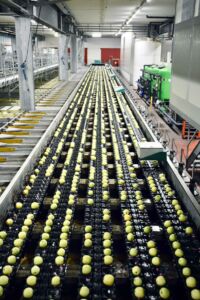
According to data from the OECD's Global Plastics Outlook, around 40% of global plastic waste comes from packaging. Packaging represents 37% of total plastic waste in the U.S., 38% in Europe, and 45% in China. Together, these regions account for 60% of global packaging waste generation. This level of production and consumption has led to a significant increase in waste, which often ends up in landfills or as environmental pollution. Therefore, the shift towards reusable and recyclable packaging is more urgent than ever. The implementation of smart tracking systems, like RFID, enables efficient resource management and reduces the environmental impact associated with food service logistics. In this post, we will explore how RFID implementation can help transform logistics in the food sector.
Transition to Reusable Packaging: Reducing Waste and Costs
Moving toward reusable containers has been shown to be a successful way to overcome problems with single-use packaging. These durable alternatives not only significantly reduce waste accumulation but also optimize operational costs by decreasing the need for single-use resources.
However, the adoption of reusable packaging comes with logistical challenges. The key to success lies in ensuring that containers are tracked and returned efficiently. This is where technologies, like RFID, play a crucial role enabling tracking each unit. This approach ensures that containers are recovered, cleaned, and reused in a sustainable cycle, maximizing their value.
How Smart Tracking Improves Efficiency in the Food Service Industry
Smart tracking through RFID in food is revolutionizing logistics management. RFID tags, containing unique information for each container, allow companies to monitor the movement of packaging across all stages of the logistics cycle.
In addition to reducing losses and improving traceability, this technology also facilitates the collection of operational data. The information acquired assists in spotting possible problems before they become serious ones, including container loss or inefficient transportation. This level of control not only improves sustainability but also drives operational efficiency across the supply chain.
Enhanced Inventory Management: Ensuring Resource Efficiency
One of the areas where RFID tags in food are particularly beneficial is inventory management. Thanks to these tags, companies can quickly identify products, their location, and expiration dates. This significantly reduces human errors and minimizes food waste.
The result is greater efficiency in resource use, as perishable products are delivered more quickly to consumers.

Key Benefits of Integrating Tracking Solutions in Food Logistics
Integrating smart tracking solutions,like RFID readers, offers multiple advantages to the food service logistics:
- Waste reduction: The use of reusable containers eliminates large amounts of disposable packaging.
- Sustainability: Promotes more responsible, environmentally friendly logistics practices.
- Improved traceability: Fast and accurate identification of products and containers throughout the supply chain.
- Cost savings: Lower operational expenses through more efficient resource management.
- Regulatory compliance: Facilitates adherence to environmental regulations like the PPWR Law while enhancing corporate reputation.
Future Trends in Sustainable Food Service Logistics
A number of important initiatives aimed at reducing environmental effect are driving the future of food service logistics toward higher sustainability:
- Stricter Regulations: Laws like the PPWR Law set ambitious goals, such as reducing packaging waste by 15% by 2040 and ensuring all packaging is recyclable by 2030.
- Innovative Materials: Emphasis on monomaterial and recycled packaging facilitates recycling processes and reduces waste.
- Automation and Data Analysis: Integration of advanced systems enables more efficient tracking of products and resource management, improving traceability and reducing waste.
- Circular Economy: Promotes the design of packaging that can be reused instead of discarded, fostering a continuous cycle of use, recycling, and repurposing, contributing to long-term sustainability.
These trends, along with technologies like RFID, are reshaping the sector into a more efficient and eco-friendly model. Companies that adopt these practices will not only be better positioned to comply with regulations but also to meet the demands of environmentally conscious consumers.
